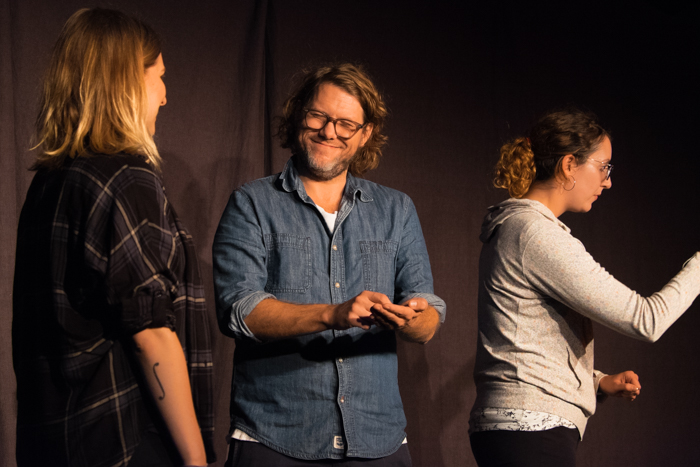There is something dreamlike about improvisational theatre. Dreams and improv both instill a feeling of surreal unpredictability, an atmosphere of colourful chaos, and a sense of blurry boundlessness. They keep you on your toes and pull you into a distinctly unique experience while breaking down the walls between reality and imagination. Dreamtime, which was organized and performed by students of Montreal Improv, masterfully took advantage of these similarities to create a performance based on people’s dreams.
The venue, Montreal Improv, is a relatively small theatre on St-Laurent. The theatre room can only be described as clandestine, with its neat rows of folding chairs and nearly non-existent lighting. This dim, minimalist setting exudes a feeling of privacy and intimacy, which implores audiences to forget about the outside world and fully engage with the performance.
The show’s opener, Frank Mythic—a duo comprised of Andrew Assaf and Dimitri Kyres— performed an improv set based on the word “metro.” Starting with the premise of a man looking for his lost brother in a subway station with the help of a police officer, the story quickly unfolded into an epically amusing mock mystery. The act was not flawless; they broke character and let out a few chuckles in the dramatic sequences, yet, their blunders were largely drowned out by the laughter erupting from the audience.
Frank Mythic was followed by Genghis, a group composed of Kate Bradley, Paige Cooper, Al Lafrance, Paul Piro, and Stefan Spec. The group opted to perform a series of shorter skits based on a random assortment of props. While their performances were somewhat difficult to follow, their style of humour—bold and wacky—often hit the right note with the audience.
Afterwards, showrunners Isobel Cully and Helena Vassiliou took to the stage to introduce Dreamtime and its team, made up of themselves, Jason Grimmer, James McGee, Jaymie Métivier, and Mariana Vial. As with each of their performances, Dreamtime requested that audience members contribute interesting ideas from dreams they’ve had to serve as a springboard for the improvised act. Before the performance, one audience member shared her dream about a visit from a faceless ex-boyfriend.
To the tune of the 1958 classic “Mr Sandman,” Dreamtime came onstage, with their act proving to be an unpredictable hilarity. Instead of recreating the described dream scene-for-scene, the performers presented a collection of different stories based on different features of it and the feelings it aroused. The main plot was about the faceless man, portrayed by Cully. However, there were many other skits, with one particularly memorable story based on McGee’s portrayal of a man with a strange fascination with his girlfriend’s feet, based off of the mention of feet in the dream. The most unique aspect of the show was that the different subplots would play out almost coincidentally, with two different stories at times performed at once.
After the show, Cully elaborated on the team’s use of disorganized transitions.
“Instead of trying to make the ideas [focused on] dreams, making the format and the transitions more like dreams was the intention.” Cully said. “It’s kind of like how [different parts of] dreams just melt into one another.”
Every performer played multiple roles, each with distinct personalities and backgrounds, yet there was a unique sense of personal style that they were able to inject into their characters. McGee stood out the most in this aspect—every one of his characters would make the audience break out in awkward laughter, but for different reasons.
“[What I like the most about improv] is that you can be someone else while being 100 per cent yourself,” said Cully. “In improv, you can use your own experiences to do something completely different from what you would do in real life.”
Despite the wide range of scenarios and forms of humour showcased by the performers, everything ultimately came together to create an experience which successfully captured the feeling of a dream. Although the show intentionally demanded incohesiveness and chaos, it was clear that the team was working as a singular body—they were never thrown off by each other’s eccentricities. Vassiliou explained that this teamwork is why she enjoys improv.
“Improv is an art form where you can’t ever get too comfortable.” she said. “It’s a practice in teamwork and communication.”
The Dreamtime team is looking forward to hosting more shows at Montreal Improv. Vassiliou encourages McGill students to attend future performances.
“Keep your ears to the ground for more improv shows,” she said. “And remember your dreams so you can come share them!”








